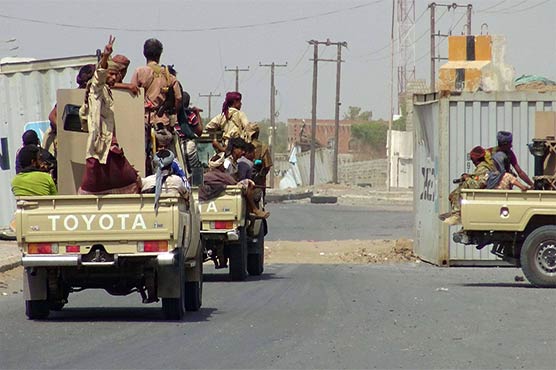149 people killed as Yemen rebels hold back loyalists in Hodeida
Mon 12 Nov 2018, 13:48:19

Hodeida, Yemen: At least 149 people including civilians have been killed in 24 hours of clashes between government loyalists and rebels in Yemen’s flashpoint city of Hodeida, medics and military sources said Monday.
A source in Yemen’s pro-government military coalition, which is backed by Saudi Arabia and its regional allies, said the Huthi rebels had pushed back a large-scale offensive aimed at moving up the Red Sea coastline towards the Hodeida port, a lifeline to 14 million Yemenis who face mass starvation.
Government forces, led on the ground by Emirati-backed troops, have made their way into rebel-held Hodeida after 11 days of clashes, reaching residential neighbourhoods in the east on Sunday and sparking fears of street fights that would further endanger civilians trapped in the city.
Residents and government military sources have reported rebel snipers stationed on rooftops in civilian streets in eastern Hodeida, a few miles from the port on the western edge of the city.
The Hodeida offensive has sparked international outcry unprecedented in nearly four years of conflict between Yemen’s Huthis, who are linked to Iran, and the Saudi-backed government.
Aid groups fear for the safety of nearly 600,000 people living in Hodeida — and for millions of others dependent on its port for what little food and humanitarian aid trickle into impoverished, blockaded Yemen.
A military official in Hodeida on Monday confirmed seven civilians had died, without giving further details.
Medics in hospitals across the city reported 110 rebels and 32 loyalist fighters killed overnight, according to a tally.
Sources at the Al-Alfi military hospital, seized by the rebels during their 2014 takeover, said charred body parts had been delivered there overnight.
Military sources confirmed that the Saudi-led alliance had targeted the rebels with multiple air strikes.
The rebels have begun to transfer their wounded to Sanaa, the capital, which the Huthis seized during a 2014 takeover that included a string of ports on the Yemeni coastline.
Saudi Arabia and its allies intervened in the Yemeni government’s fight against the Iran-backed Huthis in
2015, triggering what the UN now calls the world’s worst humanitarian crisis.
2015, triggering what the UN now calls the world’s worst humanitarian crisis.
The Saudi-led alliance drove the rebels from the Yemeni coast, but have failed to retake Hodeida despite multiple attempts.
Nearly 600 people have been killed since clashes erupted in Hodeida on November 1, ending a temporary suspension in a government offensive to take the city that began in June.
The Saudi-led alliance has come under intense international pressure to end the conflict in Yemen, particularly following the killing of Saudi journalist Jamal Khashoggi.
Khashoggi, a Washington Post columnist who was killed in his country’s consulate in Istanbul on October 2, was an ardent critic of Saudi Arabia’s powerful Crown Prince Mohammed bin Salman, who has spearheaded the kingdom’s controversial role in the Yemen war.
Multiple countries, including Germany and Norway, halted arms sales to Saudi Arabia after Khashoggi’s killing.
The United Nations’ Yemen envoy, Martin Griffiths, is pushing for peace talks between the Huthis and Saudi-backed government by the end of the year. Multiple UN-brokered negotiations have failed to find a solution to the Yemen conflict.
The United States, which for years provided military training and aerial refueling for the Saudi-led coalition, on Saturday announced it would end its inflight refueling support for the alliance.
British Foreign Secretary Jeremy Hunt will visit Saudi Arabia on Monday, where he will seek to build support for UN efforts to end the conflict, the Foreign Office said.The coalition has been blacklisted by the United Nations for the killing and maiming of children, particularly in air raids on rebel-held territory.
Hodeida port has been under blockade by the coalition for a year.The alliance accuses Iran of smuggling arms to the Huthis through the port, with Tehran denies. Aid groups have urged the rebels and loyalist forces to allow civilians to escape from Hodeida, where many cannot afford even a bus fare.
The World Health Organization estimates nearly 10,000 people have been killed in the Yemen war since 2015. Rights groups believe the toll may be five times as high.
No Comments For This Post, Be first to write a Comment.
Most viewed from International
Most viewed from World
AIMIM News
Latest Urdu News
Most Viewed
May 26, 2020
Do you think Canada-India relations will improve under New PM Mark Carney?
Latest Videos View All
Like Us
Home
About Us
Advertise With Us
All Polls
Epaper Archives
Privacy Policy
Contact Us
Download Etemaad App
© 2025 Etemaad Daily News, All Rights Reserved.



.jpg)






.jpg)
.jpg)








.jpg)
.jpg)
.jpg)
.jpg)
.jpg)

















